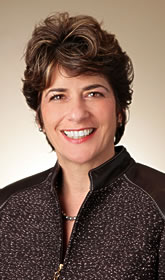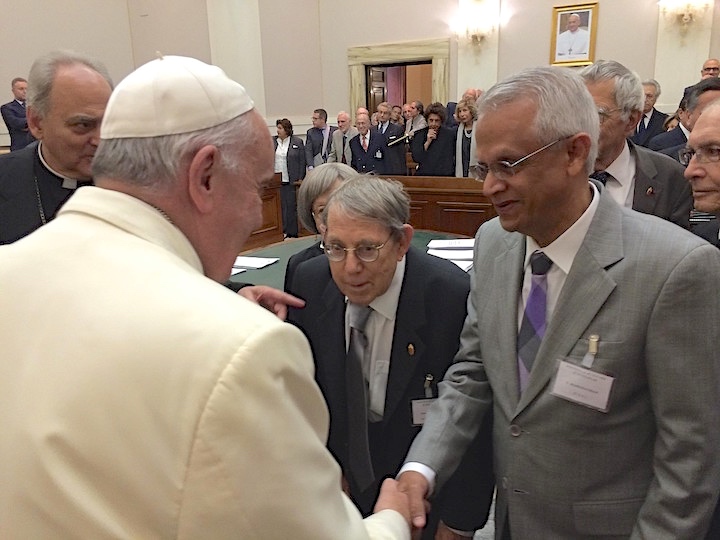Daily Business Report-Dec. 30, 2014
Above: ‘Ram’ Ramanathan meets Pope Francis during a Vatican meeting on climate change, May 2014.
How a San Diego Scientist Helped
Shape The Pope’s Climate Change Plans
Climate change will be high on the Catholic Church’s agenda in the coming year, and a San Diego scientist played a role in convincing Pope Francis to take up the issue.
In 2015, the pope will reportedly issue an edict calling on the world’s estimated 1.2 billion Catholics to take action on climate change. He’ll also visit regions devastated by recent natural disasters, and will attempt to influence United Nations’ climate talks taking place in Paris late next year.
The church is prioritizing climate change just months after the Scripps Institution of Oceanography’s Veerabhadran “Ram” Ramanathan organized a Vatican meeting on the issue.
Ramanathan said the discussion, which spanned four days in May, was encouraging.
“The Vatican agreed that we need a massive mobilization of public opinion about the seriousness of the issue, and why it’s our responsibility to be good stewards of the planet,” he said.
Ramanathan is a member of the Pontifical Academy of Sciences. He believes religious leaders are now in a better position than scientists to inspire action.
“Science has done its part,” said Ramanathan, citing the consensus among researchers that human activity is warming the planet.
Ramanathan understands the pope’s position could stir controversy with more politically conservative Catholics. But he said, “People need to hear — when they go to temples, churches, or synagogues — that this is not some scientific conspiracy. This is something that is happening.”
— KPBS
Report: Is There a Link Between
Red Meat, Sugar and Cancer?
A sugar that naturally occurs in animals but not humans could be the reason why people are at higher risk for cancer when they consume red meat, researchers at the UC San Diego School of Medicne reported Monday.
The scientists found that feeding the sugar Neu5Gc to mice engineered to be deficient in it — like humans — significantly promoted spontaneous cancers. Their study did not involve exposure to carcinogens or artificially inducing cancers, further implicating Neu5Gc as a key link between red meat consumption and cancer, according to UCSD.
“Until now, all of our evidence linking Neu5Gc to cancer was circumstantial or indirectly predicted from somewhat artificial experimental setups,” said Dr. Ajit Varki, a professor of Medicine and Cellular and Molecular Medicine and a member of the UCSD Moores Cancer Center.
“This is the first time we have directly shown that mimicking the exact situation in humans — feeding non-human Neu5Gc and inducing anti-Neu5Gc antibodies — increases spontaneous cancers in mice,” Varki said.
Red meats like beef, pork and lamb are rich in that type of sugar, according to the Varki, a co-founder of SiaMab Therapeutics Inc., a biotech with an interest in Neu5Gc and anti-Neu5Gc antibodies.
The researchers had previously discovered that animal Neu5Gc can be absorbed into human tissues.
In the newest study — published in the early edition of Proceedings of the National Academy of Sciences — they hypothesized that eating red meat could lead to inflammation if the body’s immune system is constantly generating antibodies against consumed animal Neu5Gc, a foreign molecule. Chronic inflammation is known to promote tumor formation.
Ex-USD Law Professor Sworn In
As New Superior Court Judge

San Diego’s newest Superior Court judge was sworn in Monday.
Sharon Kalemkiarian, 58, was a partner at Ashworth, Blanchet, Christenson and Kalemkiarian for the past 14 years before being appointed to the bench by Gov. Jerry Brown.
Kalemkiarian was an adjunct professor at the University of San Diego School of Law from 2010 to 2014, director of San Diego Project Heartbeat from 1996 to 2000, supervising attorney at the University of San Diego School of Law
Child Advocacy Clinic from 1993 to 1996 and a Skadden fellow at the Legal Aid Society of San Diego from 1991 to 1993.
She served as a law clerk to the U.S. District Court Judge Gordon Thompson from 1989 to 1991.
Her law degree came from USD’s School of Law, and her bachelor’s from Princeton University.
Kalemkiarian, a Democrat, fills the vacancy created by the conversion of a court commissioner position in February.
Her annual salary will be $184,610.
— City News Service
HIV Patients Experience Higher Rate
Of Hearing Loss, SDSU Study Finds
Compared to adults without HIV, HIV-positive adults are at higher risk for hearing loss independent of their severity of infection or adherence to medications, according to a new study published in the journal JAMA Otolaryngology — Head & Neck Surgery. It is the first comprehensive study to examine hearing loss after accounting for the effect of HIV medication use, adherence and HIV related-disease factors.
Researchers have known since the early 1980s that there appears to be an association between HIV and hearing loss, but it has proven difficult to explain exactly how and why it occurs.
Peter Torre, a hearing scientist who specializes in epidemiology at San Diego State University, conducted the study with colleagues from Georgetown University, Johns Hopkins University and the National Institute on Deafness and Other Communication Disorders (NIDCD). The National Institutes of Health funded the study.
The researchers recruited middle-aged HIV-infected participants from two long-standing HIV cohort studies: men from the Multicenter AIDS Cohort Study, which began in 1984, and women from the Women’s Interagency HIV Study, which began in 1994. The recent study was overseen by Michael Plankey, an infectious disease epidemiologist and investigator for both cohort studies.
Torre, the study’s lead author, designed an experimental procedure to screen these participants for various symptoms of hearing loss. After being screened out for various prior symptoms of hearing loss, each participant had a standard clinical hearing test at a university-based audiology clinic to determine whether they could hear a variety of tones ranging from 250 to 8000 hertz at different volume thresholds. The researchers also collected data on how long the HIV-positive participants’ had been taking HIV medication and how adherent they were to the treatment regimens. They also measured participants’ white blood cell count and the amount of HIV virus in the blood to determine disease progression.
Governor Reappoints 2 to San Diego
Regional Water Quality Control Board
Tomas Morales, 51, of San Diego, and Gary Strawn, 68, of Santee, have been reappointed to the San Diego Regional Water Quality Control Board by Gov. Jerry Brown.
Morales has served on the board since 2011. He has been principal at Morales Legal since 2012. He was partner at Golub and Morales LLP from 2004 to 2011 and an attorney at Thorsnes, Bartolotta, McGuire from 2000 to 2004. Morales was a partner at Strong and Morales APC from 1994 to 2000 and an associate at Aguirre and Eckmann from 1993 to 1994, at Sanger and Associates from 1992 to 1993, at Hatch and Parent from 1990 to 1992 and at Lillick and McHorse from 1988 to 1989. Morales is a Democrat.
Strawn has served since 2010. He was an engineering consultant at Gary Strawn Consulting from 2007 to 2012 and a program manager at United Technologies Hamilton Sundstrand from 1988 to 2006. He served as an officer in the U.S. Navy from 1968 to 1988. Strawn is registered without party preference.
The positions require Senate confirmation and the compensation is $100 per diem.
San Diego Employers Association Presents
35th Annual Employment Law Update
The San Diego Employers Association will present its 35th annual Employment Law Update — an opportunity for employers to obtain latest labor and employment law news — on Jan. 14 at Crown Plaza San Diego, 2270 Hotel Circle North, Mission Valley. Hours: 7:30 a.m. to noon. Breakfast included.
The event will summarize the latest labor and employment law news that directly affects employers. Attendees will learn about the latest rulings and legislative developments in California and about their impacts on businesses in San Diego.
Topics include Key Legal Developments, Top Employers’ Mistakes of 2014, and Headline News for Employers.
Speakers include Rich Paul of Paul, Plevin, Sullivan & Connaughton; Lonny Zilberman of Wilson, Turner, Kosmo; and Christopher Olmsted of Ogletree Deakins.
Cost: $105 SDEA members/$125 nonmembers. Regular rates: $125 members/$145 nonmembers.
To register, visit www.sdeahr.org or call (858) 505-0024 or email info@sdeahr.org.
San Diego Private Bank Completes
Acquisition of First Security Business Bank
San Diego Private Bank in Coronado announced that it completed the acquisition of approximately $50 million in loans and the assumption of $8 million in deposits from First Security Business Bank on Dec. 26. First Security Business Bank will close its only office in Orange, Calif.
San Diego Private Bank has four branch locations in Coronado, San Diego, La Jolla and Newport Private Bank in Newport Beach.
Sullivan Solar Power Becomes Region’s
Only Professionally Accredited Company
Sullivan Solar Power announced today that it has become the first and only professionally accredited solar company in the San Diego Gas & Electric territory. The accreditation is from the North American Board of Certified Energy Practitioners.
The North American Board of Certified Energy Practitioners developed a company accreditation program that provides consumers a way to find companies that are committed to high quality installation standards and adhere to industry best practices; hiring fully trained and qualified staff; safe work practices; and customer accountability.
While thousands of working professionals have received technical certifications from NABCEP, San Diego-headquartered Sullivan Solar Power has been recognized as the fourth and largest solar firm to receive company-wide accreditation in the United States, the company said.
Since the company’s inception, Sullivan Solar Power’s electricians receive more than 5,000-hours of training. The company has secured multiple contracts with high-profile clients such as San Diego State University, University of California San Diego, SDG&E, the Port of Long Beach and the Naval Facilities Engineering Command.
Plastic Bag Ban Opponents
Turn in Referendum Signatures
The battle over whether to ban single-use plastic bags in California looks like it’ll continue for two more years. Opponents of the law signed by Gov. Jerry Brown this fall said they’re turning in enough signatures to force a voter referendum in November 2016.
Assuming the referendum has enough valid signatures to qualify, California’s statewide plastic bag ban won’t take effect as scheduled in July. Instead, it’ll only take effect if voters approve the law a year and a half later.
“Any delay of bad legislation is a good delay,” said Jon Berrier with the association that represents plastic bag manufacturers. He said the ban would force consumers to pay for paper bags — but the proceeds wouldn’t help the environment.
“This money goes 100 percent to the grocers and it’s a profit stream that will ultimately make them billions of dollars,” Berrier said.
But Mark Murray with Californians Against Waste said plastic bags pollute the environment and never biodegrade. “The plastic bag manufacturers are the only ones with a profit motive on this issue. They’re the ones selling $200 million worth of plastic bags into California,” he said.
Murray said environmental groups will fight the referendum — and push for more local plastic bag bans until California voters can settle the issue.
— Capital Public Radio
Qualcomm Donates $800,000
To UC San Diego for Robotics
Qualcomm has donated $800,000 to UC San Diego to support the school’s growing efforts to design robots and other machines that continually learn to operate more efficiently and effectively, the U-T San Diego reports.
The money will go to the university’s Qualcomm Institute, a think tank and test bed for technology, health and education. San Diego-based Qualcomm is one of the school’s main benefactors, providing support that has enabled the campus to grow while also helping the company evolve into a world leader in computer chips and wireless telecommunications.
UC San Diego is already deeply involved in “machine learning,” or developing software and algorithms that analyze and apply the data they collect. Such software is often designed to look for patterns, especially among consumers and computer users.
For example, the software on Facebook adjusts the news feed of its users based on people’s online behavior and choices. Facebook and companies like Amazon also use such software to determine what advertisements people will see.


